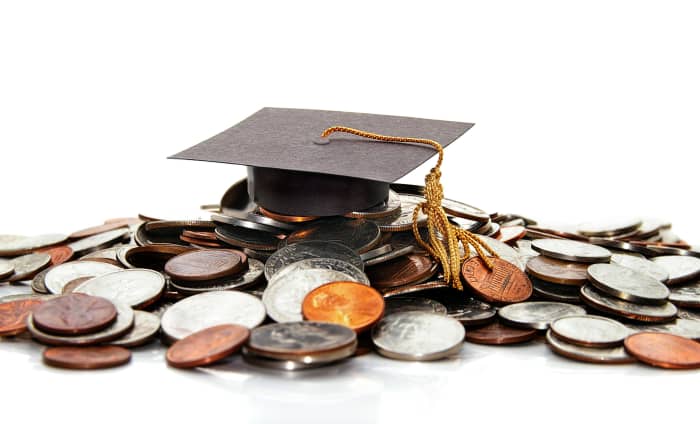‘I didn’t really understand the loan process.’ I borrowed $50K for culinary school, but now I owe $90K. At times I’ve only made $9 an hour, ‘and now the damage is done.’ How can I ever get out of debt?

How to get out of student loan debt
Getty Images/iStockphoto
Question: I went to culinary school where I received a bachelor’s degree in culinary management. At the time in 2007, I didn’t know it would put me in $50K of debt. I didn’t really understand the loan process, nor did anyone explain it to me or my mother. When I left school, I was only making $9/hour in kitchens and couldn’t pay my loans — even though I went to a good school and love to cook — and it took a while for me to move up. I started to do a little better in 2017, but I used up as many forbearances as I could until I was truly able to pay back the loan.
Then the pandemic hit. I got back into a rut and I still haven’t paid anything. Now I feel overwhelmed because I owe $90K. I also feel school cost me more than I would ever be able to earn directly after. I went to culinary school with the naive notion that I would be a chef once I left, but you have to struggle as a cook in the kitchen for a while before you make any kind of money. I wish the school had given me clear direction, but they’re a for-profit school and now the damage is done. What should I do?
Answer: You’re not alone: Most college students lack experience with borrowing money, yet are treated as adults for the purpose of borrowing for school. “Often, their parents lack experience with education debt also. The loan counseling required by the U.S. Department of Education is minimal and many for-profit, public and non-profit colleges do not go beyond the required counseling,” says student loan expert Mark Kantrowitz, author of Who Graduates from College? Who Doesn’t? The good news? You may have options like borrower defense programs, as well as loan forgiveness and income-based repayment options (though these two options are typically only available to those with federal student loans, so if you have federal loans and want to take advantage of these, you likely don’t want to refinance).
Have a question about getting out of student loan or other debt? Email [email protected].
Culinary arts students often dream of opening their own restaurant and becoming the next Julia Child, but most will not. Indeed, it can be tough to make good money in the restaurant biz, requiring years of work, and even then there are no guarantees. Therefore, it’s not uncommon for the total debt at graduation to exceed the average annual income of a culinary arts graduate.
Still, you may be wondering how it’s possible that student loans could grow to almost double the amount originally borrowed. For one, interest accrues on your debt while you’re in school and it continues to do so during the grace period of six months following graduation. During deferments and forbearances, interest likely also continues to accrue, and if you default on your loan, interest, collection fees and late charges can ramp up your balance significantly.
Look into borrower defense programs
Bobby Matson, CEO of Payitoff, a fintech debt management company, says you may be able to minimize or eliminate the burden of this debt because of where you went to school. “Your university was [likely] for-profit and ended up shutting down in 2019, which means you should look into borrower defense programs to have your debt entirely forgiven. This is absolutely the first thing you should do as there are plenty of similar cases and there are policies designed for these kinds of circumstances,” says Matson. This student aid website can help you explore borrower defense programs and can tell you if you qualify.
Consider an income-driven repayment plan
If your debt isn’t forgiven, and you have federal loans, switch to an income-driven repayment plan — which bases your monthly loan payments on how much you earn and could mean you pay as little as $0 per month — with the intention of ultimately having your debt forgiven. “This is the advice any student loan expert would likely give this borrower,” says Matson.
It’s important to note that income-driven repayment plans can be negatively amortized, meaning that the loan payment is less than the interest that accrues. “The loan balance will increase. But the remaining debt will be forgiven after 20 or 25 years worth of payments with an income-driven repayment plan, so the growing loan balance is more of a psychological burden than a debt that will have to be repaid,” says Kantrowitz.
Look into forgiveness — and get help with the debt
Michael Kitchen, student debt expert and senior managing editor at Student Loan Hero, says the good news is even a $90,000 obligation can be manageable by pursuing student loan forgiveness for your federal student loans (private student loans tend not to have generous forgiveness options). “If you work at a nonprofit or for the government, then the Public Service Loan Forgiveness program will wipe away your student loans after 10 years, even including the time you were not making payments due to the pandemic forbearance,” says Kitchen.
And you don’t have to stick with a food service job. “Perhaps another job with a nonprofit or government office would be easier to get. People don’t know their future earnings when they sign up for these loans and assume they will earn more than they do. Fortunately, the job market is strong now,” says Diana Furchtgott-Roth, adjunct professor of economics at George Washington University and former chief economist at the US Department of Labor.
- Letters edited for brevity and clarity




